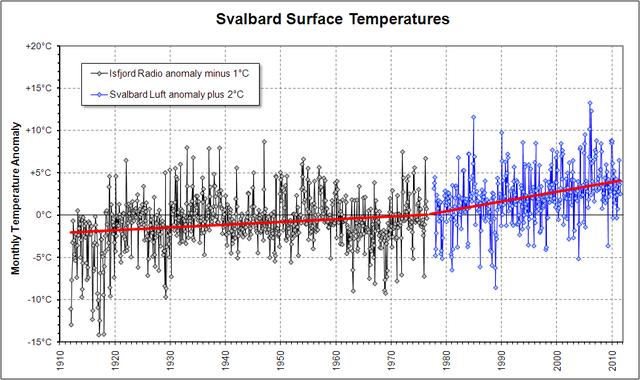 |
This is a file from the Wikimedia Commons. Information from its description page there is shown below.
Commons is a freely licensed media file repository. You can help.
|
Summary
Svalbard surface temperature mean monthly anomalies 1912 to 2011, in °C. Anomalies are station monthly temperatures minus the local average for the month.
The recording station moved some 47 km from Isfjord Radio (78.1°N, 13.6° E) to Svalbard Luft (78.2°N, 15.5°E) in 1976, with little record overlap. There is an obvious station temperature difference, here largely removed by plotting anomalies from monthly averages instead of the raw temperatures.
A common base period for computing anomalies is not available because of the lack of record overlap. The base intervals used here are 1912-1976 for Radio and 1978-2007 for Luft (both near to the local full record). Because of the differing base intervals, the long-term uptrend results in a substantial step change in anomaly (circa 3°C) at the station change. To produce an indicative combined anomaly plot, the difference is here crudely adjusted by moving Radio down by 1°C and Luft up by 2°C, so that the trend lines meet at the station change. The resulting zero crossing is near 1975, so the plotted anomalies relate approximately to the commonly adopted 1960-90 interval.
The Svalbard record shows one of the strongest long-record warming trends on Earth, in close agreement with the pattern of climate model predictions.
Source
Data from NASA GISS Surface Temperature Analysis.
Licensing
|
I, the copyright holder of this work, hereby publish it under the following license:
|
File usage
The following pages on Schools Wikipedia link to this image (list may be incomplete):
SOS Childrens Villages chose the best bits of Wikipedia to help you learn. SOS Children's Villages believes education is an important part of a child's life. That's why we ensure they receive nursery care as well as high-quality primary and secondary education. When they leave school, we support the children in our care as they progress to vocational training or higher education. There are many ways to help with SOS Children's Villages.


